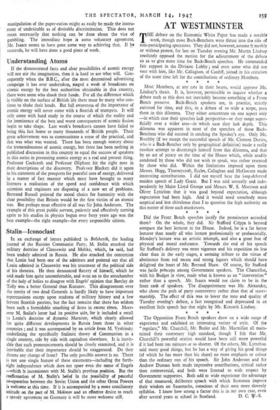AT WESTMINSTER
THE debate on the Economic White Paper has made a notable' week, though most Back-Benchers were thrust into the role of non-participating spectators. They did not, however, assume It meekly or without protest, for late on Tuesday evening Mr. Martin Lindsay resolutely opposed the motion for the adjournment of the debate so as to give more time for Back-Bench speeches. He commanded fair support in the Division Lobby ; and even some who did not vote with him, like Mr. Callaghan, of Cardiff, joined in his criticism of the scant time left for the contributions of ordinary Members.
* * * *
Most Members, at any rate in their hearts, would approve Mr. Lindsay's thesis. It is, however, permissible to inquire whether a debate such as this does not inevitably become something of a Front Bench preserve. Back-Bench speakers are, in practice, strictly rationed for time, and this, in a debate of so wide a scope, puts them in this dilemma. They either concentrate on one aspect only —in which case their speeches lack perspective—or they range super- ficially over a wider area—in which case they lack depth. This dilemma was apparent in most of the speeches of those Back- Benchers who did succeed in catching the Speaker's eye. Only Mr. Boothby (if we except the successful speech of Mr. Clement Davies, who is a Back-Bencher only by geographical definition) made a really resolute attempt to disentangle himself from this dilemma, and that by an act of piracy on the time of the House which, while readily condoned by those who did not wish to speak, was rather resented by those who did. Within the limitations imposed upon them Messrs. Hogg, Thorneycroft, Eccles, Callaghan and McGovern made interesting contributions. I did not myself hear the long-deferred maiden speech of Lady Grant. But I was told severally and inde- pendently by Major Lloyd George and Messrs. W. S. Morrison and Oliver Lyttelton that it was good beyond expectation, although expectation had been high. And it would need somebody more sceptical and less chivalrous than I to question the high authority on this matter of three such musketeers.
* * * * Did the Front Bench speeches justify the prominence accorded them? On the whole, they did. Sir Stafford Cripps is beyond compare the best lecturer in the House. Indeed, he is a far better lecturer than nearly all who lecture professionally or professorially. Monday's lecture was an artistic triumph, and also a great feat of physical and moral endurance. Towards the end of his speech Sir Stafford's delivery was more vigorous and his exposition nb less clear than in the early stages, a seeming tribute to the virtue of abstinence from red meats and strong liquors which should have delighted the heart of Mr. Bernard Shaw. Of course, Sir Stafford was facile princeps among Government speakers. The Chancellor, with his Budget in view, made what is known as an " intervention " rather than a speech. Mr. Isaacs would not claim to be in the front rank of speakers. The disappointment was Mr. Alexander, who chose the path of party controversy rather than that of states- manship. The effect of this was to lower the tone and quality of Tuesday evening's debate, a fact recognised and deprecated in an excellent little speech late that night by Mr. Kenneth Lindsay.
* * * * The Opposition Front Bench speakers drew on a wide range of experience and exhibited an interesting variety of style. Of the "regulars," Mr. Churchill, Mr. Butler and Mr. Macmillan all main- tained their customary high standard, though I felt that Mr. Churchill's powerful oration would have been still more powerful if it had been ten minutes or so shorter. Of the others, Mr. Lyttelton said many good things, but he has a way of giving his good things (of which he has more than his share) no more emphasis or colour than the ordinary run of his speech. Sir John Anderson and Sir Andrew Duncan both made impressive contributions, critical rather than controversial, and both were listened to with respect by Government supporters. Both add to wide experience the advantage of that measured, deliberate speech with which Scotsmen impress their wisdom on Sassenachs, conscious of their own more slovenly syllables. I know how strong a factor this is in my own case, even after several years at school in Scotland. D. C. W.-S.


































 Previous page
Previous page